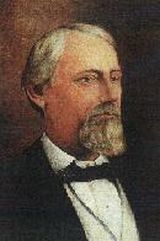Rufus W. Cobb
| Rufus Willis Cobb | |
|---|---|
 |
|
| 25th Governor of Alabama | |
|
In office November 28, 1878 – December 1, 1882 |
|
| Preceded by | George S. Houston |
| Succeeded by | Edward A. O'Neal |
| Member of the Alabama Senate | |
|
In office 1872 1876 |
|
| Personal details | |
| Born |
February 25, 1829 Ashville, Alabama |
| Died | November 26, 1913 (aged 84) Birmingham, Alabama |
| Political party | Democratic |
Rufus Willis Cobb (February 25, 1829 – November 26, 1913) was an American Democratic politician who was the 25th Governor of Alabama from 1878 to 1882.
Rufus Wills Cobb was born in Ashville, St. Clair County, Alabama. Cobb's ancestors came to America from England and Wales, first settling in Virginia in the colonial era and moving to what would become the state of Alabama in the early 1800s. He was the son of John W. and Catherine (Stevens) Leak Cobb, who lived on a plantation at Ashville. Cobb was educated at an academy in Ashville and graduated from the University of Tennessee, at Knoxville, in 1850. Returning to Ashville, he read law in the office of John C. Thomasson and was admitted to the bar in 1855 . He practiced law in St. Clair until he moved to Shelby County, Alabama, in 1867 and became a law partner of B. B. Lewis.
When war was proclaimed in 1861, Cobb joined the Confederate Army as captain of Co. C., Tenth Alabama Infantry Regiment, Forney's brigade, and went to Virginia with that regiment. He remained there until, in 1863, he was assigned to General Joseph Wheeler's cavalry in Tennessee and placed in charge of a scouting party. At the end of the war Cobb resumed his law practice.
Cobb was elected to the Alabama state senate in 1872 and in 1876. During his term in the state senate, he collaborated with Peter Hamilton of Mobile on a plan for readjusting the state debt, a plan subsequently adopted by the legislature. Cobb was a friend and advisor of Governor George Smith Houston during Houston's administration.
Cobb was elected governor in 1878 and reelected in 1880. "He had a quiet administration, without striking events." (Owen, p. 357) The population of Alabama was growing, by 1880 the federal census recorded 1,262,505, and the problems of administrative finance and control of the railroads fell to Cobb. "His administration made improvements in tax assessment and reduced the cost of surplus in the state treasury." (Stewart, p. 127)
...
Wikipedia
